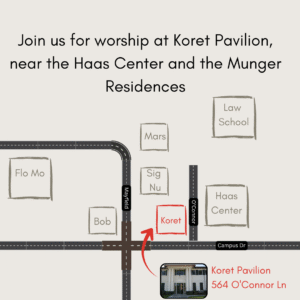Video hosted by Google, which also allows you to download the video to your computer, your iPod, or your PSP.
Each week at Chi Alpha we record our messages in video and in MP3 format, and we also maintain a sermon archive (which includes instructions on receiving our sermons as a podcast). If you’d like to come visit us next week, you can learn when and where we meet.
This week (3/15/2006) we emphasize that worship is not a concert, it is a collaboration. It is not about performance, it is about participation. In the final analysis, everyone is on the worship team.
LISTEN TO MP3
[FLASH]http://xastanford.org/playmp3.swf?mp3=http://xastanford.org/messages/everyone-is-on-the-worship-team.mp3,200,35[/FLASH]
DOWNLOAD THE MP3
Hitting the play button above is the easiest way to listen, but if you prefer to download the message you can click the link below:
Everyone Is On The Worship Team
MP3 Length: 29:24
MP3 Size: 12 MB
Some Biblical Expressions of Corporate Worship
- Singing: the book of Psalms, Ephesians 5:19, Colossians 3:16
- Music: 1st Chronicles 13:8, Psalm 33:3, Psalm 150
- Artistic Creation: Exodus 31:1-11, Exodus 28, Ezekiel 4:1
- Clapping: Psalm 47:1, Isaiah 55:12
- Words: Psalm 9:1, Psalm 73:28, Psalm 78:4-6
- Laughing & Rejoicing: Psalm 9:2, Psalm 126:1-3, Psalm 149:5, Zephaniah 3:14-17
- Shouting: Psalm 95:1, Psalm 98:4-6, Psalm 100:1
- Silence: Psalm 46:10, Habakkuk 2:20
- Standing: 1st Chronicles 23:30, Psalm 24:3-6
- Raising Our Hands: Nehemiah 8:6, Psalm 63:3-5, Psalm 134:1-2, 1st Timothy 2:8
- Bowing & Kneeling: 2 Chronicles 7:3, Psalm 95:6, Daniel 6:10-11
- Lying Prostrate: Deuteronomy 9:18, Revelation 19:4
- Leaping: 2nd Samuel 6:16, Luke 6:23, Acts 3:7-8
- Dancing: Exodus 15:20-21, Psalm 149:3, Psalm 150:4
- Speaking In Tongues: Acts 10:45-46; 1 Corinthians 14:26-33
There are different ways to categorize these expressions. For example, you could break them down into verbal, physical, and impulsive displays of worship. You could categorize them as inwardly focused or outwardly focused. Which way you mentally group them is irrelevant: what matters is that you remain open to all of them.
Some additional thoughts:
While still an atheist, Lewis had a hard time understanding why God would command people to worship Him. This seemed very petty to Lewis. After converting, Lewis reflected further on the nature of praise.
But the most obvious fact about praise—whether of God or any thing—strangely escaped me. I thought of it in terms of compliment, approval, or the giving of honor. I had never noticed that all enjoyment spontaneously overflows into praise unless (sometimes even if) shyness or the fear of boring others is deliberately brought in to check it. The world rings with praise-lovers praising their mistresses, readers their favorite poet, walkers praising the countryside, players praising their favorite game-praise of weather, wines, dishes, actors, motors, horses, colleges, countries, historical personages, children, flowers, mountains, rare stamps, rare beetles, even sometimes politicians or scholars. I had not noticed how the humblest, and at the same time most balanced and capacious, minds, praised most, while the cranks, misfits and malcontents praised least . . . I had not noticed either that just as men spontaneously praise what ever they value, so they spontaneously urge us to join them in praising it: “Isn’t she lovely? Wasn’t it glorious? Don’t you think that magnificent?” The Psalmists in telling everyone to praise God are doing what all men do when they speak of what they care about. My whole, more general, difficulty about the praise of God depended on my absurdly denying to us, as regards the supremely Valuable, what we delight to do, what indeed we can’t help doing, about everything else we value.
I think we delight to praise what we enjoy because the praise not merely expresses but completes the enjoyment; it is its appointed consummation. It is not out of compliment that lovers keep on telling one another how beautiful they are; the delight is incomplete till it is expressed.
C. S. Lewis, Reflections on the Psalms, pp. 93-95.
In a conference lecture [Mary Jo Leddy] reported that the playwright-president of the Czech Republic, Vaclav Havel, was asked why the “Velvet Revolution” against the communists in the former Czechoslovakia was successfully nonviolent—and we might add, why it remains effective when so many other satellites of the former USSR are presently in turmoil. Havel answered somewhat like this: “We had our parallel society. And in that parallel society we wrote our plays and sang our songs and read our poems until we knew the truth so well that we could go out to the streets of Prague and say, ‘We don’t believe your lies anymore’—and communism had to fall.”
Marva Dawn, Worship To Form A Missional Community,(for the original Havel quotation, see Mary Jo Leddy’s address in the volume from the conference Confident Witness—Changing World, ed. Craig Van Gelder (Grand Rapids, MI: Eerdmans, 1999).



